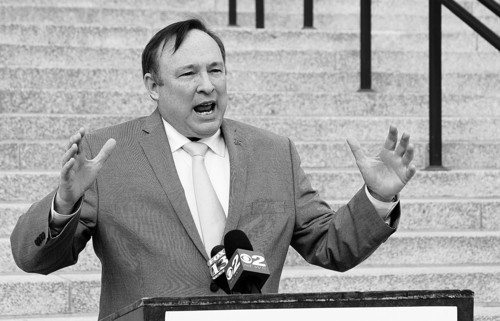This is an archived article that was published on sltrib.com in 2012, and information in the article may be outdated. It is provided only for personal research purposes and may not be reprinted.
The Democratic Party on Monday won more time to make its case that the Legislature should reverse what Democrats call a nasty "bait and switch" on costs charged for records that the party figures will show shenanigans on redistricting. But its chances for ultimate victory seem slim.
The party says a "bait and switch" occurred because it paid the Legislature the $5,000 estimated cost for the records. But when it went to pick them up, it was charged $14,250 instead — and denied most records until that is paid.
Still, after a testy three-hour hearing Monday before the Legislative Records Committee — consisting of the top Republican and Democrat in both the House and Senate — retiring House Democratic leader David Litvack said he figures his party was charged a fair price and doubts that more testimony will change his mind.
But he voted for the continuance amid arguments that the party was given only two businesses days to prepare for the hearing, and, by rule, should have had at least five days. The continued meeting must happen by Sept. 4.
Voting for the continuance with Litvack was Senate Democratic leader Ross Romero and Republican Senate President Michael Waddoups. Republican House Speaker Becky Lockhart opposed it.
"Release these secret documents," Utah State Democratic Party Chairman Jim Dabakis, told the leaders. He later charged that Republicans are "making transparency as hard as possible. What are they hiding from?"
Dabakis argued that legislative staff told the party it would cost an estimated $5,000 to obtain documents it sought through open meetings laws about communication between legislators and others on redistricting, which the party hoped might give a peek into closed-door GOP caucuses on redistricting.
After fee waiver requests were denied, Dabakis said the party paid the $5,000. But when it went to pick up documents later, it was told the cost nearly tripled to $14,250. It was given only one of three boxes of documents until the full price was paid — and was not given a choice of which box it could take.
"They put all the good stuff in boxes two and three, and you should see what's in [number] one … it's nothing," Dabakis told reporters after the hearing. He said it was unfair to charge his party nearly $10,000 more without warning nor permission to run up extra research and copying costs as they occurred.
Robert Rees, with the office of Legislative Research and General Counsel, said more time and effort were needed than estimated, and his office was under no legal obligation to warn about increasing costs. The party was charged for 506 hours of staff time at $25 per hour, and $1,600 in copying costs at 10 cents a page.
Dabakis said spending an extra $10,000 of taxpayer money without knowing whether his party would pay for it "is not good government."
While Dabakis said his party has money available to pay the extra cost, it is not fair that it is charged so much above estimates without warning.
Joe Hatch, attorney for the party and a former Salt Lake County Council member, noted that state open records laws allow the Legislature to waive fees for documents when release is primarily in the interest of the public, and not primarily in the interest of the requestor.
But Rees said that Legislative staff rejected fee waivers amid Democratic proclamations that it was seeking documents to help it figure whether to challenge redistricting in court — so release was primarily in the party's interest.
Hatch sought extra time to bring testimony perhaps from news media representatives or academics whom he said likely would argue that release is primarily in the public interest.
Litvack, however, said he feels the party was charged a fair price, about the same rate per page as Republicans were charged for a smaller request that focused only on Democrats. He also said all legislative staff took a full week to work on the Democratic request, and it is fair to pay for it —and he doubts any testimony will change his mind.
Ivan DuBois, executive director of the Utah Republican Party, also testified that Democrats "made a wide-sweeping request that tied up government resources for weeks. This misused government resources, and they should pay for it."
Dabakis said his party has not yet decided whether to sue over redistricting, "We have 10 years," he said, noting that's how long new districts will last.
Democrats say their partisan data show that new congressional districts are each between 62 and 74 percent GOP. Republicans say those estimates are a bit high, and the new districts are between 59 and 72 percent Republican.



